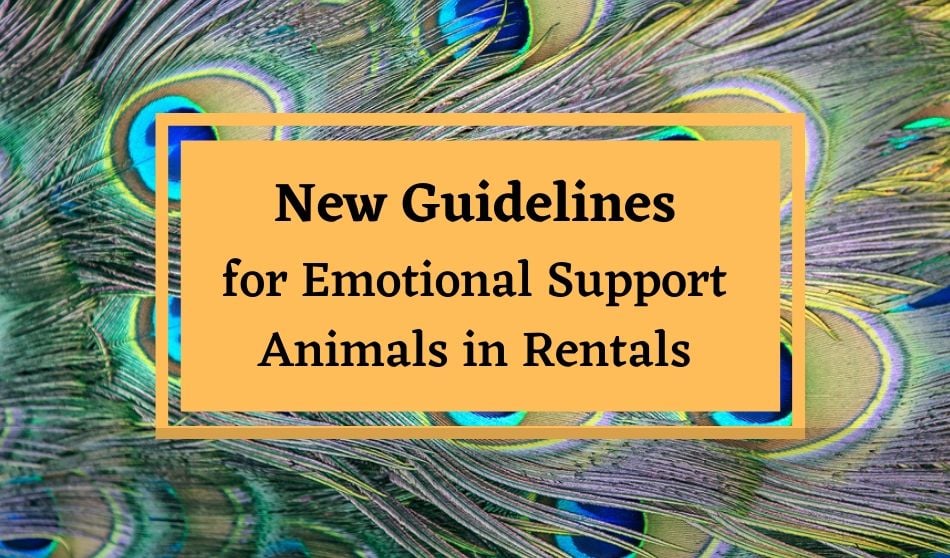
When it comes to letting an emotional support animal fly, the airline industry has been in a balancing act between accommodating the needs of an individual with those of the collective passengers on board.
The phrase ‘when pigs fly’ has new meaning when you consider the types of animals that have been airborne.
It hasn’t been unheard of for emotional support miniature horses to fly. Other non-traditional support animals such as ducks, snakes, cats, and monkeys have taken to the sky. These special accommodations come with risks regarding property damage as well as health and safety. A few years back an emotional support peacock was denied a seat on an airplane for that reason.
Landlord Concerns for Allowing Pets in a Rental
It’s no different for the rental industry. Landlords have a concern that animals will cause damage to the rental unit. They may also harm other residents, and/or cause health issues if not cared for properly. In that, many landlords have established either strict pet policies that cover type, breed, behavior or have gone so far as to ban pets altogether.
As a landlord, understand that although your property may be ‘pet-free’ or there are breed or other restrictions, under the Fair Housing Act (FHA), a reasonable request for a service or emotional support animal (ESA) must be entertained.
A German Shepard might be on your breed restriction list for a pet. However, a service animal may be any breed unless it has shown itself a direct threat to others.
HUD New Guidelines for Reasonable Accommodation Requests
The US Department of Housing and Urban Development (HUD) has just released new guidelines on handling those reasonable accommodation requests to help landlords and property managers with those obligations.
The document indicates that the most HUD charges of discrimination are against housing providers denying reasonable accommodations. It goes on to say FHA complaints regarding denied reasonable accommodations are up 60% and are on the rise.
They anticipate that these new guidelines will help landlords understand their obligations and set best practices for addressing requests while reducing the number of discrimination claims and complaints.
The new HUD guidelines cover how to assess a person’s request to have a service animal as a reasonable accommodation under the FHA and includes:
- Understanding what is and isn’t an emotional support animal and/or service animal
- The two important (and ONLY) questions to ask someone requesting a service animal
- Request analysis for assistance animals other than service animals
- Criteria for assessing whether to grant requested accommodations
- Types of animals including unique animals for unique circumstances
- Best practices for documenting an individual’s need for an assistance animal
They highly advise reading the new HUD guidelines together with the Reasonable Accommodations Under the Fair Housing Act Joint Statement of The Department of Housing and Urban Development and the Department of Justice located here: https://www.hud.gov/sites/documents/huddojstatement.pdf
Note: An Emotional Support Animal (Service Animal) is Not a Pet
The nuances in lingo surrounding this topic can be confusing. For instance, take these common terms that have been often used interchangeably:
Emotional support animal
Service animal
ESA animal
Assistance animal
ADA service animal
Guide animal (such as a guide dog)
Comfort animal
Psychiatric service dog
What the list above holds in common is that none of the above are considered pets when acting in a capacity to assist individuals with disabilities. In other words, pets can be trained to perform tasks. However, the main purpose of a service animal (regardless of the term given) is to provide a service for someone with a disability.
A trained service animal can be a huge asset providing valuable assistance with tasks around the home.
The Department of Transportation (DOT) disability upcoming rulings propose to change the definition of a service animal in the Air Carrier Access Act (ACA) to match the American Disability Act (ADA) to allow only trained service animals aboard airplanes in the future.
As a result, these future DOT rulings may impact how HUD moves forward with FHA guidelines in the distant future. In the meantime, this newly released document with current guidelines will help landlords and property managers in assessing and handling those reasonable accommodation requests today.